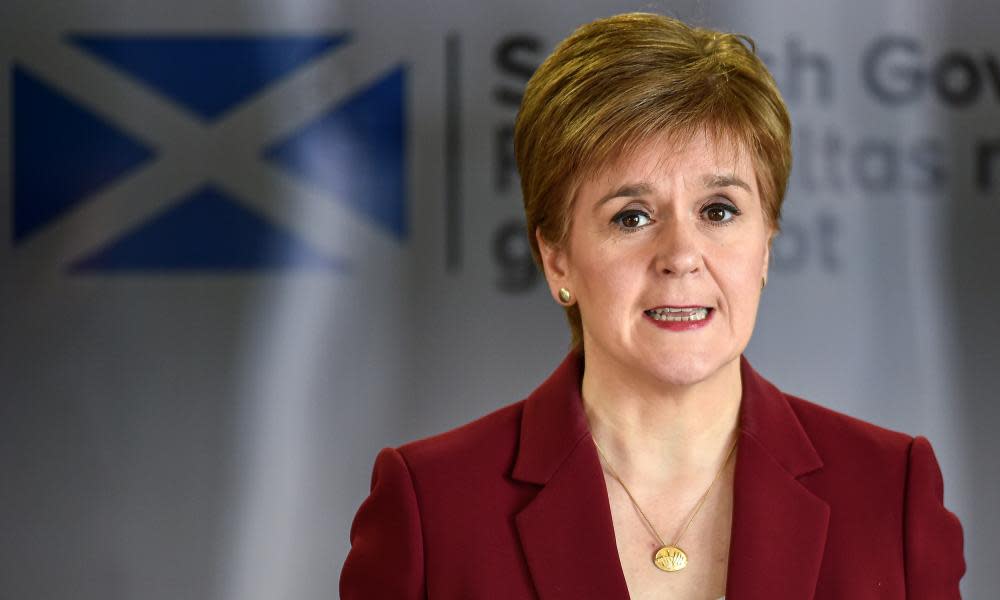Scotland drops plans to suspend jury trials during coronavirus crisis

The Scottish government has dropped plans to suspend jury trials for up to 18 months during the coronavirus lockdown after an outcry from lawyers, Scottish National party MPs and UK cabinet ministers.
Mike Russell, the Scottish constitutional affairs secretary, told MSPs the proposals had been withdrawn because of complaints and would start urgent talks with other parties, victims organisations and the legal profession on alternative options.
At the start of a debate on emergency legislation to help public services cope with the coronavirus crisis, Russell said new measures would be tabled at Holyrood’s next sitting on 21 April after “intensive and wide-ranging discussions on alternatives”.
Nicola Sturgeon, the first minister, confirmed on Tuesday that her government wanted to suspend jury trials to ensure courts were able to hold trials in the most serious cases during the coronavirus lockdown.
The proposals were backed by Lord Carloway, the lord justice general, Scotland’s most senior judge, who said the judicial system would be overwhelmed unless the courts were allowed to carry on with significant cases.
However, the proposals were condemned from across the legal profession and faced significant opposition from other parties at Holyrood, which threatened to break the political consensus on responding to the pandemic.
The bill, which is due to be passed in a single sitting, also includes temporary measures to allow the early release of prisoners to relieve pressure on prisons; allowing councils to evict dementia patients from hospital beds without their consent; and a ban on landlords evicting tenants who cannot afford their rent.
In a further policy reversal, the Scottish government indicated it was amending plans to dramatically relax the rules and deadlines on freedom of information requests after advice from the Scottish information commissioner.
The Law Society of Scotland, which represents solicitors, said early on Wednesday it understood the need for extraordinary measures during the crisis but said the case for one of the most dramatic changes to the legal system ever considered had not been made.
John Mulholland, the society’s president, said there was “deep concern” across the profession after the Scottish criminal bar association, which represents court room lawyers of all ranks, denounced them on Tuesday as “premature, disproportionate and ill advised”.
“We fully appreciate the desire to avoid any backlog in cases which might interfere with the proper administration of justice. However, we have not reached that point and so there is not sufficient justification to warrant trials without jury for serious criminal offences,” Mulholland said.
Michael Gove, the Cabinet Office minister, urged Sturgeon to reconsider the “deeply concerning” proposals. In a tweet, he said: “I applaud the Scottish government for their generous co-operation in the fight against Covid-19 but is it wise to take this position on jury trials? I stand ready to help and discuss – I make no criticism of colleagues facing difficult decisions but let’s talk.”
Joanna Cherry QC, an SNP MP who helped lead legal challenges to the UK government’s Brexit policies last year, called on her colleagues in Holyrood to put the proposals on hold.
“The right to a jury trial and the rule against hearsay with only the strictest exceptions are cornerstones of our criminal law,” she tweeted. “They should be guarded jealously and I am sure MSP colleagues will want to consider these proposals very, very carefully.”
The government has told MSPs the European convention on human rights obliges states to maintain an effective justice system. Social distancing regulations during the lockdown meant it was impossible for juries to sit together, while illnesses and self-isolation would affect witness availability and safety.
Russell told MSPs there was a pressing need for a plan to get the courts working again. “The courts must be allowed to function. By the end of the month, we must have the means to ensure that can happen but we want, and I stress this, we want those means to command the widest support possible,” he said.

 Yahoo News
Yahoo News 
